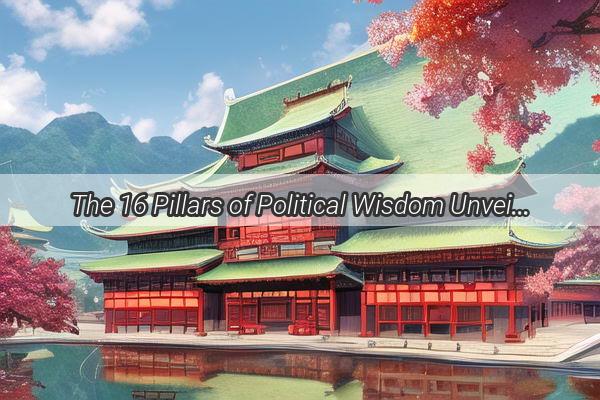The 16 Pillars of Political Wisdom Unveiling Chinas Historical Blueprint for Governance
Embark on a captivating journey through the annals of Chinese history as we delve into The 16 Pillars of Political Wisdom: Unveiling China's Historical Blueprint for Governance. This comprehensive exploration reveals the timeless principles that have shaped the nation's political landscape for millennia, offering invaluable insights for leaders and citizens alike.
In ancient China, the pursuit of harmony, stability, and justice was a paramount concern for emperors and philosophers. Over centuries, a rich tapestry of political thought emerged, encapsulating the essence of governance in a series of core principles known as the 16 Pillars of Political Wisdom. These pillars have served as a guiding star for Chinese leaders, influencing everything from dynastic rule to modern governance.
1. The Mandate of Heaven: The belief that a ruler's legitimacy stems from divine approval, compelling leaders to maintain virtue and moral integrity to retain their right to rule.
2. Confucian Virtues: Emphasizing the importance of moral character, humility, and respect for elders, Confucian principles have shaped the ethical fabric of Chinese society.

3. The Rule of Law: The principle that all individuals, including rulers, are subject to the law, ensuring fairness and justice in the administration of the state.
4. Harmony: Achieving balance and unity among different factions, promoting social stability and tranquility.
5. The People's Welfare: Prioritizing the well-being of the populace, ensuring that policies reflect the needs and aspirations of the citizens.
6. The Five Elements: The ancient Chinese understanding of the interplay between the five elements—wood, fire, earth, metal, and water—guiding leaders in maintaining balance and harmony in nature and society.
7. Moral Leadership: The belief that a leader's moral conduct sets the example for the nation, inspiring loyalty and devotion among the populace.
8. The Middle Path: Avoiding extremes and seeking balance in all aspects of governance, from economic policies to foreign relations.
9. The Emperor's Edict: The issuance of imperial edicts as a means of direct communication with the people, fostering a sense of connection and shared purpose.
10. The Mandarinate: The merit-based civil service system that has historically ensured that the most qualified individuals govern the land.
11. The Four Books: The foundational texts of Confucianism—Analects, Mencius, Great Learning, and Doctrine of the Mean—providing moral and political guidance for rulers and citizens.
12. The Five Relationships: The principle that harmony in familial, social, and political relationships is crucial for a stable society.
13. The Art of War: Sun Tzu's strategic insights, emphasizing flexibility, intelligence, and discipline in both war and governance.
14. The Four Noble Truths: The Buddhist teachings that guide leaders in alleviating suffering and achieving enlightenment for the people.
15. The Silk Road: The ancient trade route that facilitated cultural exchange, economic growth, and diplomatic relations, showcasing China's role as a global power.
16. The Chinese Dream: The aspiration for a prosperous, harmonious, and modern China, rooted in a deep connection to its historical roots.
The 16 Pillars of Political Wisdom are not merely relics of the past; they continue to resonate with contemporary Chinese leaders and policymakers. As China forges ahead into the 21st century, these ancient principles offer a treasure trove of knowledge and inspiration, reminding us that the essence of effective governance lies in the pursuit of justice, harmony, and the well-being of the people.
By understanding the intricate tapestry of China's political history, we gain a unique perspective on the forces that have shaped one of the world's oldest civilizations. The 16 Pillars of Political Wisdom serve as a timeless reminder that the art of governance transcends time and place, offering valuable lessons for leaders and citizens across the globe.









